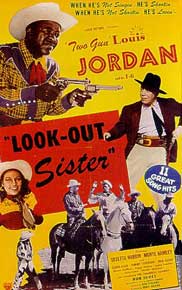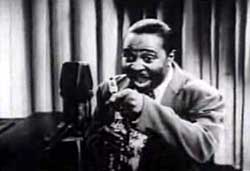 Look Out Sister (1946) is in the main a black-cast western, a tad over an hour.
Look Out Sister (1946) is in the main a black-cast western, a tad over an hour.
It does not set the western mood immediately. Rather, it opens with Louis & his band at a radio station doing their regular show in the big city. We see the back of the heads of two soundboard operators, & through the window, Mr. Jordan's band swinging, singer Louis with big sax solo.
They're performing the excellent jump-jazz number "Jack, You're Dead," in exactly the same positions they were in for scenes in Reet, Petite & Gone while singing "The Texas & Pacific" & "All For the Love of Lil." Obviously these scenes were filmed at the same time pretty much like independent soundies to be snipped into whichever film for which Louis needed another song.
Louis Jordan has a philosophy to share in "Jack, You're Dead," namely, "If a chick is smiling at-you/ Even though there's nothing said/ If you stand there like a statue/ Jack, you're dead." There's much less mugging than usual on Jordan's part, although a little, & the sentiment is awfully similar to his chart-reaching rap song "Beware."
This song was #1 in 1947 on the R & B charts & stayed there for seven weeks. It was a cross-over hit on the national charts, reaching #21. Cross-over hits were almost impossible in this era of segregated radio play, but Jordan's popularity on jukeboxes, films, & the Armed Services transcriptions distributed to soldiers overseas, helped him over that hurdle.
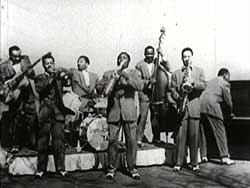 The radio performance is prefaced with images of train travel, & after the song we see more train travel, an image of the Zanzibar Cafe. The radio performance is prefaced with images of train travel, & after the song we see more train travel, an image of the Zanzibar Cafe.
And then Jordan is singing "Caldonia" with his band shown lined up in its entirety for really the only moment in the film. And it's the last time we see them in regular suits instead of cowboy outfits.
This rendition of the hit song is completely different performance than in his film Caldonia (1945).
Though credited as the Tympany Five in the opening credits, the drumhead is clearly visible in several scenes & says "T6." The six band members are named in the opening credits, seven if we count Louis.
The members of Jordan's band was a shifting thing but for this film, they are Paul Quinichette on tenor sax, William Dodgett at the piano, William Hadnott on bass, Chris Clumbus drumming, & Aaron Izenhall with trumpet. Besides of course Jordan on alto sax & vocals.
After these opening numbers & the train-travel montage, Jordan has an emotional collapse from over work & is taken to the sanitorium to recover. The booking agent Mac Gordon (Monte Hawe) doesn't take the appearance cancellations well, &am threatens to sue Jordan if he appears any more of his damned benefits while cancelling paying gigs.
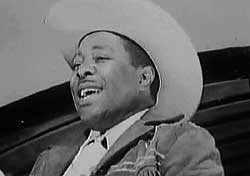 While in the rest home, he is kind to all his fellow paitients, & has taken a particular liking to Billy (Glen Allen), a little boy who wants to get well & become a cowboy.
While in the rest home, he is kind to all his fellow paitients, & has taken a particular liking to Billy (Glen Allen), a little boy who wants to get well & become a cowboy.
That night, after taking his medication, he goes into dream-world where he & his bandmates are known as Two-Gun Jordan & His Jivin' Cowhands.
There's really no reason for this affection of it being a dream, as the "black cowboy" films that preceded this one pretty much established that you could travel from modern-day Harlem to a dude ranch out west where everything was just like in a cowboy movie complete with six-guns & stage-coaches & of special value for Louis Jordan, musical ho-downs.
A couple of the actors were also seen in those previous all-black westerns. The characer of "Cactus" is played by Tom Southern who is in Harlem Rides the Range (1939), The Bronze Buckeroo (1939), & Two-Gun Man from Harlem (1938). Officer Lee in Look Out Sister is played by Maceo Scheffield, who is in Harlem on the Prairie (1937).
The band gets off the plane at a tiny airport in Lookout, Arizona, & is picked up by a surrey & taken to the H & H dude ranch which caters to city folks looking for the old-west experience, but with state of the art swimming pool & dance club on premises.
While riding the surrey, Jordan sings "My New Ten Gallon Hat," with steel guitar bits to give it a western swing blend with Jordan's jump-jazz beat. Though credited as always as "the tympany five" the dreamhead will later be seen to say "T6" on it, due to the addition of James Jackson on guitar.
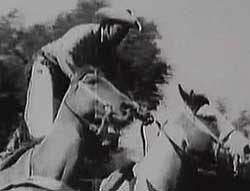 The owners of the dude ranch are sister & brother Betty (Suzette Harbin, who was the nurse in the sanitorium) & Bob, played by Bob Scott (who also played one of Jordan's fellow patients). Bob was an authentic champion black rodeo star whose trick-riding & broco-busting skills will be highlighted during the film. The owners of the dude ranch are sister & brother Betty (Suzette Harbin, who was the nurse in the sanitorium) & Bob, played by Bob Scott (who also played one of Jordan's fellow patients). Bob was an authentic champion black rodeo star whose trick-riding & broco-busting skills will be highlighted during the film.
Betty & Bob allow poor inner city kids at their dude ranch free, & are reliant on a few big-money patrons to stay afloat.
Glenn Allen as Billy reprents such kids. He will appear throughout as the cutest little-kid cowboy, & his presence no doubt in part (along with Jordan's effective clowning & the inclusion of a few strong kid-appeal numbers) accounts for this having been a favorite film of ghetto kids of the 1940s.
The villain -- same guy who threatened to sue Jordan in the waking world -- is trying to blackmail Betty into an unwanted marriage, or he will foreclose on her mortgage & take her land. He has discovered there's oil under the land but Betty & Bob don't know it.
That's pretty much all the "plot" the story requires to frame a sizeable number of songs. Two-Gun Jordan does some comedy ridin' & shootin' & fightin' but it's pure clowning, he's not playing a western hero. He's playing a really nice bandleader who is prone to doing benefit shows for causes he admires. His heroism here is in putting on a show to raise money for the ranch, & the film is packed with a dozen wonderful tunes.
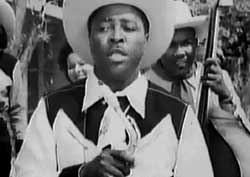 He begins his stay at the dude ranch singing "Don't Burn the Candle at Both Ends," partly a rap-song about not overdoing life, with some cynical stuff in the lyrics. This song reached number 4 on the R & B charts in 1948.
He begins his stay at the dude ranch singing "Don't Burn the Candle at Both Ends," partly a rap-song about not overdoing life, with some cynical stuff in the lyrics. This song reached number 4 on the R & B charts in 1948.
It's a reminder that rap isn't such a new form for the African American community. And Jordan probably also influenced the beatnik poets of the 1950s with songs like "Don't Burn the Candle," "Saturday Night Fish Fry," "Beware," & "Look Out, Sister," all of which were R & B hits.
He'll sing three songs in this "arrived at ranch" set. Following "Candle" with "Chicky-mo" with amusing jump-jazz lyrics & Peggy Thomas dancing near his side:
"Chicky-mo chicky-mo craney-crow/ I went to the well to wash by toe/ When I got back my slick little chick was gone/ I'm a little Joe who's feeling low/ There's only one thing I'd like to know/ Why in the world would my slick little chick leave home/
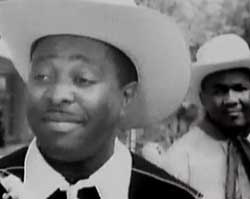 "She done flew the coop & gone/ She left me all alone/ Mm, I wish I knew/ Why she left me here so lonely & blue/ "She done flew the coop & gone/ She left me all alone/ Mm, I wish I knew/ Why she left me here so lonely & blue/
"Chicky-mo chicky-mo craney crow/ I ain't goin' to the well no mo'/ Hangin' around till my sweet little chick comes home/ It's a natural fact she left me holding the sack/ I'll stay on the track till my chick gets back/ Hanging around till my sweet little chick comes home."
The use of "chick" for a beautiful woman was certainly not original to Louis but he was singularly responsible for popularizing it in songs like "Chicky-mo," "That Chick's Too Young to Fry," & in many of his lyrics. His 1948 hit song "Daddy-O" & many of his jive-talk lyrics can be heard re-echoed in beatnik youth culture of the '50s.
The third song in this set is a jump-blues classic Jordan co-wrote with Wilhelmeina Gray "We Can't Agree" which runs in part: "You never treated me gentle/ Yet you spend up all of my gold/ Then you look around for a young man/ Tell me I'm too old/ That's why we can't agree; Yeah baby, we can't agree/ If I don't see you no mo' baby/ That'll be way too soon for me."
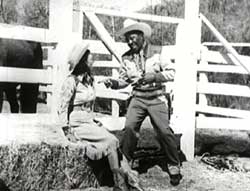 The cynical humor would seem to be understated by a man whose first wife twice tried to kill him with a knife & almost succeeded the second time. The cynical humor would seem to be understated by a man whose first wife twice tried to kill him with a knife & almost succeeded the second time.
In the next scene, with Betty out in the barnyard, Jordan sings "Boogie in the Barnyard," with lots of farm-animal photography inserted.
This is a wonderfully ultra-upbeat fast-fast tune that'll thrill kids, a jump-jazz alternative to "Old MacDonald Had a Farm," but not too childish for adult appeal. In 1948 it reached #2 on the R & B charts.
Bob Scott's trick riding sequence follows, plus general "black rodeo" antics, with Jordan invited to join in for some comic relief riding. It should be noted that in this age of segregation, black dude ranches & black rodeos did exist, & this is much more than a fantasy dreamed up by Louis Jordan in a sanitorium.
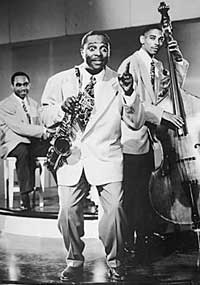 If I may let my mind wander a bit while I think of Louis Jordan's music more broadly than from this film, I just love his stuff & put him at the top of my list of favorite singers.
If I may let my mind wander a bit while I think of Louis Jordan's music more broadly than from this film, I just love his stuff & put him at the top of my list of favorite singers.
In his hey-day through the 1940s, he was a hit machine, with plenty of catchy grabbers like "At the Swing Cat's Ball" & "Choo Choo Ch'Boogie" takin' you right back to the track, Jack, & his marvelous hits "Caldonia" & "Is You Is Or Is You Ain't My Baby" & so many others that place him among the immortals.
But Jordan considered himself almost as much a commedian as he was a jazzman, & the majority of his music is, well, if not spoiled by whimsicality, not the first tunes to come to most folks' mind when pondering the great jazz singers & songs of the 1940s. In fact he was one of the great ones, but Jordan was practically begging not to be taken seriously despite that greatness.
His recordings include lots of comic or semi-comic numbers like "Doug the Jitterbug" who "cuts a wicked rug" or "Ain't Nobody Here But Us Chickens" or quite an original interpretation of "Honeysuckle Rose." The jumpin' syncopated-rap song "Saturday Night Fish Fry" is another one that makes you want to dance, but with whimsical lyrics imbedded in a great sound.
Occasional outright comedy takes over, as in Jordan's rendition of "Barnacle Bill the Sailor," "Beans & Cornbread," "Two Little Squirrels (Nuts to You)," "Fat Sam from Birmingham," "You Dyed Your Hair Chartreuse," & his giant hit "Open the Door Richard." These sometimes require the listener to be in a mood for the comic more than for the music.
He's too rarely one-hundred percent serious, but when he is, wow. A bluesy "I'm Gonna Move To the Outskirts of Town" is moving.
One of the numbers in Look Out Sister which is perhaps too greatly to the side of comedy is "You're Much Too Fat." It has a nice jump-jazz boogie beat, but the song is needlessly cruel, with a fat woman enacting fat-girl gags while the song is in progress.
This one shouldn't've been sung by a dude who was pals with such great big-women singers as June Richmond with whom he co-starred in Reet, Petite & Gone. In the set up, babes are leaping off a diving board, & when a fat woman appears in her bathing suit to jump in the water, everyone around the pool laughs & laughs.
Jordan immediately begins singing "You're much too fat fat fat/ You better lose it, you can't use it" & "You're much too large/ You're like a barge."
He should've gotten to know that fat gal in the context of the minimal story so as to have a reason to apologetically sing his much better fat-girl number "I Like 'Em Fat Like That" with the lyrics "Let the cats all criticize/ Joke about my baby's size/ She's all reet with me because you see/ I like 'em fat like that." But that one he doesn't sing here.
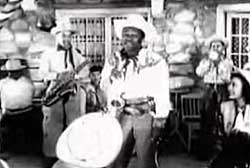 We're up to eight songs & if we count the instrumental version of "Turkey in the Straw" there'll be twelve numbers when all is done, not even counting that Jordan's band is providing the instrumentation for the entire soundtrack.
We're up to eight songs & if we count the instrumental version of "Turkey in the Straw" there'll be twelve numbers when all is done, not even counting that Jordan's band is providing the instrumentation for the entire soundtrack.
For a film that's only a hair over an hour length, this many songs doesn't leave a lot of time for the plot, but the plot is sufficient & it's the songs that matter anyway.
Jordan arranges a Jamboree fund raiser to save the ranch from the clutches of the evil mortgage holder. There'll be some plot points separating the tunes, but mainly the rest of Jordan's dream of the dude ranch will be the finishing numbers at the Jamboree. During the instrumental "Turkey & the Straw" he & Peggy Thomas dance with furious whimsicality.
The next number begins with Jodan's bluesy sax solo then directly into the lyrics for "I Got Those Roamin' Blues," a number which would reach #3 on the R & B charts in 1949. That hits kept spinning out of this film for three years shows how lastling Look Out Sister was for a generation of African Americans who made it much more than a two-weekend-hit.
Louis is looking great as a cowboy with holstered six-gun, singing, "I thought I'd made it Jack/ In good old Albukirk/ You know I was on the wrong track/ You know they tried to make me work/ I hit the road but quick/ Yes that judge was much too slick/ That ain't no place to settle, I hit the road right quick."
Unfortunately that lyric is about being lazy more than it's about being a wanderer, & the next verse is about being a craps-playing loser: "Las Vegas was the next stop/ That fast town left me weak/ The dice man made twelve passes/ I was up the well gone creek/ Those gamblers put me down/ I had to walk right out of town/ That ain't no place to settle/ I had to walk right out of town."
The next town will be San Francisco, where he's a gigalo if not a pimp taken care of by a gal. It's unusual Louis embraces stereotypes in his songs. But as with the hurtful fat-girl song, his intent is to be a comedian as much as it is to be a great jump-jazz singer.
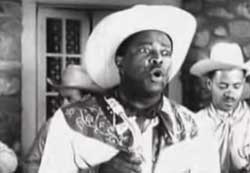 "Early in the Morning" is a very strong blues pieace, though with Jordan's jump style the blues is rather upbeat rather than sad.
"Early in the Morning" is a very strong blues pieace, though with Jordan's jump style the blues is rather upbeat rather than sad.
The number is particularly ununusual in mixing in a bit of a rhumba & somewhat spoofing Latin beat music or borrowing from it for the sake of a western setting.
"Early in the Morning" reached the #3 spot on the R & B charts in 1947, whiole "Beware" had reached #2 the year before.
The set closes with the title song, sometimes just called "Look Out" rather than "Look Out Sister." It begins with an apology for his previouis rap song "Beware" which warns men about the evil wiles of terrible women.
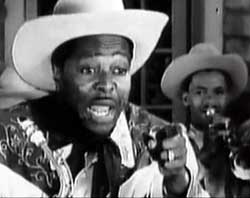 In this song-sequel, he tells the other side of the story in similarly syncopated rhyming couplets. In "Beware" he takes a strong stance against trusting women of any kind. In "Look Out Sister" he gives even more cynical advice to the gals. In this song-sequel, he tells the other side of the story in similarly syncopated rhyming couplets. In "Beware" he takes a strong stance against trusting women of any kind. In "Look Out Sister" he gives even more cynical advice to the gals.
The Jamboree numbers conclude with the villain instigating a cross-country chase on horseback, with a body double doing Jordan's "clumsy" trick riding across the ranch, the bad-guy in hot pursuit shooting at Jordan.
It's easy for us to put the few plot elements together & see the inevitable happy ending, so the filmmakers decide not to bother with that. Instead, Jordan wakes form his dream before the chase has ended.
The dream has deeply effected him. For his fellow patient Billy's sake & for the sake of hundreds of inner city kids like him, Jordan makes a phone call to put in motion the founding of a dude ranch in Lookout, Arizona, where kids can wear their cowboy hats & buckskins & learn to ride & rope & be cowboys.
copyright © by Paghat the Ratgirl
|
